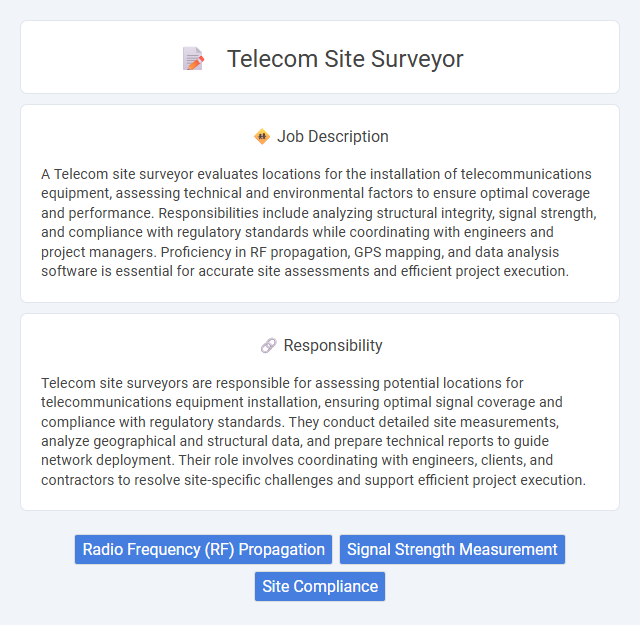
A Telecom site surveyor evaluates locations for the installation of telecommunications equipment, assessing technical and environmental factors to ensure optimal coverage and performance. Responsibilities include analyzing structural integrity, signal strength, and compliance with regulatory standards while coordinating with engineers and project managers. Proficiency in RF propagation, GPS mapping, and data analysis software is essential for accurate site assessments and efficient project execution.
People with strong technical skills and a comfort level working in varied outdoor environments are likely to be suitable for a telecom site surveyor job. Those who can handle physical activity, navigate challenging terrains, and communicate effectively with different stakeholders probably fit well in this role. Candidates who prefer stable indoor work and struggle with unpredictable conditions may find this job less suitable.
Qualification
A Telecom site surveyor requires a strong understanding of telecommunications infrastructure, including knowledge of radio frequency (RF) principles, network protocols, and site installation requirements. Proficiency in using surveying equipment, GPS technology, and software for mapping and data collection is essential. Certification in relevant fields such as RF planning, cabling standards, and occupational health and safety enhances job performance and career prospects.
Responsibility
Telecom site surveyors are responsible for assessing potential locations for telecommunications equipment installation, ensuring optimal signal coverage and compliance with regulatory standards. They conduct detailed site measurements, analyze geographical and structural data, and prepare technical reports to guide network deployment. Their role involves coordinating with engineers, clients, and contractors to resolve site-specific challenges and support efficient project execution.
Benefit
Telecom site surveyors likely benefit from gaining hands-on experience with advanced communication technologies, enhancing their technical expertise and career prospects. The role probably offers opportunities for travel and fieldwork, which can provide variety and exposure to different environments. Competitive salaries and potential for overtime pay might further increase the job's financial attractiveness.
Challenge
A Telecom site surveyor likely faces the challenge of accurately assessing diverse environments to ensure optimal network infrastructure placement, which may involve unpredictable terrain and varying regulatory requirements. The probability of encountering unforeseen technical obstacles during on-site evaluations could require adaptive problem-solving skills and quick decision-making. This role demands a high level of attention to detail, as misjudgments might lead to costly delays and suboptimal coverage.
Career Advancement
A Telecom site surveyor plays a crucial role in assessing locations for network infrastructure, ensuring optimal placement for signal strength and connectivity. Mastery in using advanced surveying tools and strong knowledge of telecommunications protocols can lead to promotions into project management or network planning roles. Continuous skill development in emerging technologies like 5G and IoT further enhances career growth opportunities within the telecommunications industry.
Key Terms
Radio Frequency (RF) Propagation
A Telecom site surveyor specializing in Radio Frequency (RF) propagation analyzes and maps signal coverage to optimize wireless network performance. They conduct field measurements and utilize advanced propagation modeling tools to assess site locations for antenna placement and interference management. Expertise in RF propagation ensures efficient cellular coverage, minimized signal loss, and enhanced network reliability.
Signal Strength Measurement
A Telecom Site Surveyor specializing in Signal Strength Measurement conducts precise evaluations of wireless signal levels to ensure optimal network coverage and performance. They utilize advanced tools like spectrum analyzers and signal analyzers to collect accurate data on signal intensity, interference, and noise levels across specific geographic areas. This data guides network design, equipment placement, and troubleshooting to enhance telecommunications infrastructure efficiency.
Site Compliance
A Telecom Site Surveyor ensures site compliance by meticulously assessing and verifying infrastructure against industry standards and client specifications. They conduct detailed evaluations of site conditions, documentation, and regulatory requirements to guarantee adherence to safety protocols and technical guidelines. Accurate reporting of compliance status enables timely interventions, minimizing project delays and ensuring seamless network deployment.
 kuljobs.com
kuljobs.com